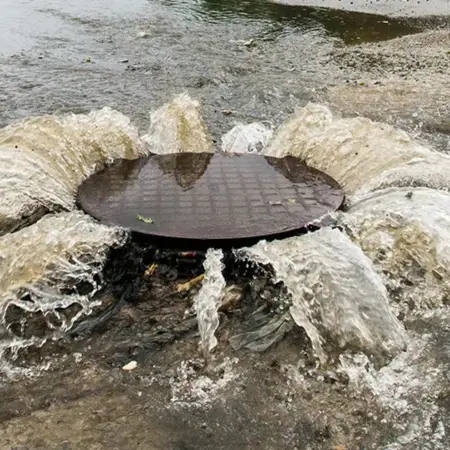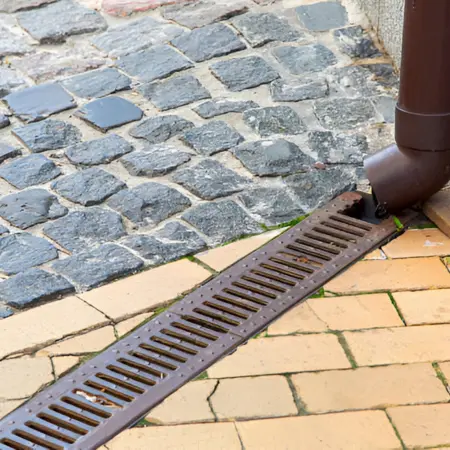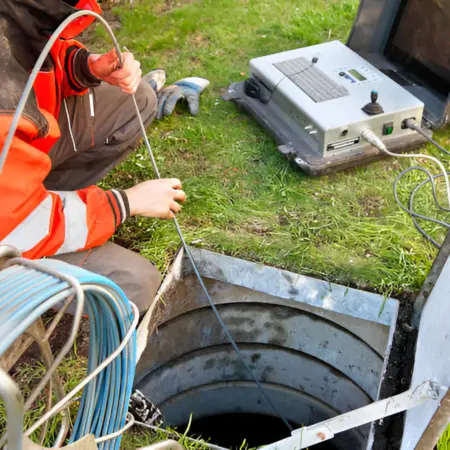Sewer backups can cause homeowners big messes and headaches.
Knowing the most common causes can help prevent them and keep your plumbing in good shape.
Let’s explore these issues and how to fix them easily.
Key Takeaways
- Sewer backups are frustrating, but knowing the causes helps prevent them.
- Blockages occur from debris, grease, and tree roots in the sewer line.
- Cracked pipes can leak and cause backups; watch for wet spots in your yard.
- Poor drainage can overload systems, especially during heavy rain.
- Heavy rainfall can overwhelm storm drains and lead to backups.
- Grease buildup in kitchen drains creates clogs; throw grease in the trash.
- Regular maintenance and mindful disposal can prevent sewer backups.
Common Causes Of Sewer Backups
Sewer backups can be very frustrating.
Knowing their common causes can help you prevent them.
1. Blockages In The Sewer Line
Blockages in the sewer line are one of the main reasons for backups.
These blockages often occur due to debris like leaves, trash, or toilet paper getting stuck.
Grease and oil from kitchens can also build up and create clogs.
Additionally, tree roots can enter underground pipes, causing serious blockages.
Common materials that cause blockages include hair and food scraps.
Unhygienic (dirty) products that should never be flushed can also contribute to these clogs.
2. Cracked Or Damaged Pipes
Aging and damaged pipes can lead to sewer backups.
Over time, pipes can crack and break due to shifting soil, tree roots, or general wear and tear.
When this happens, sewage can leak out, and pressure can build up, causing backups.
Signs of damaged pipes include wet spots in your yard and puddles that won’t drain.
You might also notice unpleasant smells around your home.
If you notice these signs, it’s essential to investigate further.

3. Improper Drainage
Improper drainage installation can also cause sewer backups.
If drainage systems are set up correctly, water can flow the right way and overload the sewer system.
This poor drainage can lead to backups during normal use and can worsen during heavy rain.
It’s important to have your drainage installed correctly.
Regular maintenance is also key to preventing these issues.
4. Heavy Rainfall And Flooding
Weather can greatly impact sewer systems.
During heavy rainfall, a lot of water can flow into the system.
This can increase its capacity and lead to backups.
Storm drains can become overwhelmed, causing water to flow back into homes.
Understanding how weather affects your sewer system is important.
It can help you take preventive measures before storms arrive.
5. Grease And Fat Buildup
Grease buildup is a common problem in kitchen drains.
When grease is poured down the sink, it can cool and solidify, sticking to the sides of the pipes.
Over time, this buildup creates blockages that can lead to backups.
Common sources of grease include cooking oils, butter, and fats from meat.
To prevent this, always dispose of grease in the trash instead of pouring it down the drain.
How To Fix Sewer Backups
Fixing sewer backups can often start with simple DIY solutions, but sometimes you need professional help.
Here’s what to do in both cases.

1. DIY Solutions
Homeowners can try a few easy methods to clear minor blockages.
First, use a plunger.
Make sure to cover the drain completely and plunge up and down firmly.
Another tool is a drain snake, which can reach deeper clogs in the pipes.
If you have a small buildup, bacteria cleaners are a safe choice.
They help break down things like food and waste.
You can also use baking soda and vinegar.
Pour them down the drain to create a fizz to help clear out small clogs.
2. Professional Help
If DIY methods don’t work, it’s time to call a professional.
You should seek help if backups keep happening or many drains are affected.
Issues like broken pipes and major clogs need expert attention.
Hiring a qualified plumber is important because they know how to fix complex problems.
They can also check for hidden issues in your plumbing system.
Contact us at Sewer Repair Service for high-quality services.
Preventing Sewer Backups
Preventing sewer backups is key to keeping your plumbing in good shape.
Here are some effective ways to avoid problems.

1. Regular Maintenance
Regular inspections and cleanings are very important.
They help catch small issues before they become big problems.
Inspecting your sewer lines at least once a year is a good idea.
Cleaning them every couple of years can also help prevent clogs and backups.
2. Mindful Disposal Practices
Be careful about what you flush or pour down your drains.
Avoid flushing items like wipes, paper towels, and feminine products, as they can cause clogs.
Don’t pour grease or fat down the sink; these can solidify and block pipes.
Instead, dispose of these items in the trash.
A strainer in your sink can help catch food scraps before they go down the drain.
3. Landscaping And Tree Placement
Managing tree roots is important for preventing sewer backups.
Tree roots can enter sewer lines and cause blockages.
When planting trees, make sure to keep them away from sewer lines.
If trees are nearby, consider trimming the roots and using root barriers.
Maintaining your landscaping can also help by reducing debris that might clog the drains.
Regular checks can keep your yard and sewer system healthy.
Conclusion
This article discusses common causes of sewer backup and how to fix them.
Understanding these causes can help you prevent frustrating plumbing issues.
Knowing how to fix them and when to call for help can keep your home’s plumbing running smoothly. Contact us at OP Plumbing Hub for excellent services.
